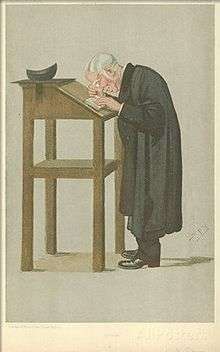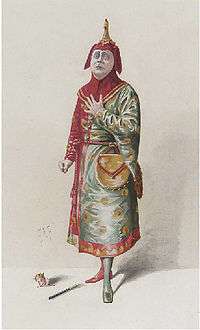Spoonerism
A spoonerism is an error in speech or deliberate play on words in which corresponding consonants, vowels, or morphemes are switched (see metathesis) between two words in a phrase.[1][2]
An example is saying "The Lord is a shoving leopard" instead of "The Lord is a loving shepherd." While spoonerisms are commonly heard as slips of the tongue, they can also be used intentionally as a play on words.
Etymology

It is named after the Reverend William Archibald Spooner (1844–1930), Warden of New College, Oxford, who was notoriously prone to this mistake.[3][4] The term "Spoonerism" was well established by 1921. An article in The Times from that year reports that,
The boys of Aldro School, Eastbourne, [...] have been set the following task for the holidays: Discover and write down something about: The Old Lady of Threadneedle-street, a Spoonerism, a Busman's Holiday...[5]
In 1937, The Times quoted a detective describing a man as "a bricklabourer's layer" and used "Police Court Spoonerism" as the headline.[6] A spoonerism is also known as a marrowsky, purportedly after a Polish count who suffered from the same impediment.[7]
Examples

The caption reads, "Through every passion raging."
The accompanying biography reads, "The only part of him which gets tired is his tongue, and occasionally the oft-repeated lines have got muddled. 'Self-constricted ruddles', 'his striggles were terruffic', and 'deloberately rib me' are a few of the spoonerisms he has perpetrated. Success has not spoilt him. He is a professional humourist, who has been known to make an Englishman laugh at breakfast."
Most of the quotations attributed to Spooner are apocryphal; The Oxford Dictionary of Quotations (3rd edition, 1979) lists only one substantiated spoonerism: "The weight of rages will press hard upon the employer" (instead of "rate of wages"). Spooner claimed[3] that "The Kinquering Congs Their Titles Take" (in reference to a hymn)[8] was his sole spoonerism. Most spoonerisms were probably never uttered by William Spooner himself but rather made up by colleagues and students as a pastime.[9] Richard Lederer, calling "Kinkering Kongs their Titles Take" (with an alternative spelling) one of the "few" authenticated Spoonerisms, dates it to 1879, and he gives nine examples "attributed to Spooner, most of them spuriously."[10] They are as follows:
- "Three cheers for our queer old dean!" (rather than "dear old queen," which is a reference to Queen Victoria)[10]
- "Is it kisstomary to cuss the bride?" (as opposed to "customary to kiss")[10]
- "The Lord is a shoving leopard." (instead of "a loving shepherd")[10]
- "A blushing crow." ("crushing blow")[10]
- "A well-boiled icicle" ("well-oiled bicycle")[10]
- "You were fighting a liar in the quadrangle." ("lighting a fire")[10]
- "Is the bean dizzy?" ("Dean busy")[10]
- "Someone is occupewing my pie. Please sew me to another sheet." ("Someone is occupying my pew. Please show me to another seat.")[10]
- "You have hissed all my mystery lectures. You have tasted a whole worm. Please leave Oxford on the next town drain." ("You have missed all my history lectures. You have wasted a whole term. Please leave Oxford on the next down train.")[10]
A newspaper column[4] attributes this additional example to Spooner: "A nosey little cook." (as opposed to a "cosy little nook").
Popular use
In modern terms, "spoonerism" generally refers to any changing of sounds in this manner.
- On the TV series Hee Haw, comedian/writer Archie Campbell was well known for using spoonerisms in his skits, most famously the "Rindercella" skit as well as previously doing so in his own comedy recordings well before the country/western-themed TV variety series, such as his "Beeping Sleauty" sketch.[11]
- In the German-dubbed version of the TV series The Fresh Prince Of Bel-Air, Geoffrey the butler frequently used accidental spoonerisms in his speech. These were added for comedic effect by the dubbing team and are not present in the original script.
- Spoonerisms are commonly used on famous names. For example, "JeBron Lames", "Jencer Spankins", "Bobe Kryant", and "Balle Herry".
- In the English translation of the children's book Finn Family Moomintroll by Tove Jansson, the characters Thingummy and Bob communicate in spoonerisms. In the original Finnish, they used Sananmuunnos.
- In the novel Alchemy by Margaret Mahy, Jess Ferret often uses deliberate spoonerisms.
- In Maisie and the Pinny Gig by Ursula Dubosarsky, a little girl named Maisie has a recurrent dream about a giant guinea pig, which she calls a "pinny gig."[12]
- In Jim Henson's Muppet rendition of "The Frog Prince" the princess Melora is under an enchantment by an evil witch forcing her to constantly speak in spoonerisms. Central to the story is her repeated plea that somebody "bake the hall in the candle of her brain," by which she really means "break the ball in the handle of her cane," referring to the orb in the witch's scepter on which her powers depend.
- Popular stand-up comic Andrew Dice Clay uses deliberate spoonerisms often as an extension of his ignorant Brooklyn "greaser" persona.
- Shel Silverstein's book Runny Babbit is made up entirely of children's stories that use spoonerisms.
- The name of electronic musician Com Truise is a spoonerism of Tom Cruise. Similarly, the name of the alternative musician Wevie Stonder is a spoonerism of Stevie Wonder.
- The rock band Buckcherry is a spoonerism of the musician Chuck Berry.
- The Washington, D.C. political comedy sketch group Capitol Steps[13] has a long-standing tradition of performing a routine called "Lirty Dies"[14] during every performance, which features a typically 10-minute-long barrage of rapid-fire topical spoonerisms. A few examples over the years range from "Resident Pagan" (President Reagan) and the U.S.'s periodic practice of "Licking their Peaders" (Picking their leaders) to the NSA "poopin' on Snutin" (Snoopin' on Putin) and "phugging everybody's bones" (bugging everybody's phones).
- The title character of Hank the Cowdog often makes this mistake, switching around opening sounds or even entire words, such as "I pushed the nose open with my door."
- “Puck Flattsburgh” is a common rallying cry in the sports rivalry between Oswego and Plattsburgh State Universities' men's ice hockey teams, especially when Oswego is victorious. The phrase is a double entendre: if read at face value, indicates the sport ("puck") and the Plattsburgh team playing "flat;" read as a spoonerism, it is a veiled profane insult.[15]
- One of Kenny Everett's most famous characters is Cupid Stunt (whose name is a spoonerism of "Stupid Cunt").
Poetry
In his poem "Translation," Brian P. Cleary describes a boy named Alex who speaks in spoonerisms (like "shook a tower" instead of "took a shower"). Humorously, Cleary leaves the poem's final spoonerism up to the reader when he says,
He once proclaimed, "Hey, belly jeans"
When he found a stash of jelly beans.
We'll tell him he should wipe his shoe.[16]
But when he says he pepped in stew
Twisted tales
Comedian F. Chase Taylor was the star of the 1930s radio program Stoopnagle and Budd, in which his character, Colonel Stoopnagle, used spoonerisms. In 1945, he published a book, My Tale Is Twisted, consisting of 44 "spoonerised" versions of well-known children's stories. Subtitled "Wart Pun: Aysop's Feebles" and "Tart Pooh: Tairy and Other Fales," these included such tales as "Beeping Sleauty" for "Sleeping Beauty." The book was republished in 2001 by Stone and Scott Publishers as Stoopnagle's Tale is Twisted.[17]
Films
- In the Mel Brooks film Robin Hood: Men in Tights, the Sheriff of Rottingham (Roger Rees) constantly speaks in spoonerisms. An example of this is the following: "Struckey has loxed again!" (He meant to say that "Loxley has struck again!")
- In Disney's Snow White and the Seven Dwarfs, the character of Doc is prone to this, e.g., "Search every crook and nanny" (rather than "nook and cranny").
Music
The musical Ruthless! has a song called "Unkie's Muncle" with a spoonerism in every line. The title is a spoonerism of "monkey's uncle."
The title of the Van der Graaf Generator's album Pawn Hearts resulted from a spoonerism by David Jackson, who said one time: "I'll go down to the studio and dub on some more porn hearts", meaning to say 'horn parts'.[18]
The title of the Butthole Surfers' fourth album Hairway to Steven is a spoonerism on Led Zeppelin's "Stairway to Heaven".
The song "Washington On Your Side" from hip-hop musical Hamilton rhymes the phrase "fits of passion" with its spoonerism "pits of fashion".
The heavy metal band Metallica released the concert video Cunning Stunts in 1998, the title being a spoonerism of "stunning cunts".
The Los Angeles hip-hop collective, Odd Future are commonly referred to as "Golf Wang" or "Wolf Gang"; they also host a carnival named "Camp Flog Gnaw," derived from "Golf" and "Wang" backwards.
Kniferism and forkerism
As complements to spoonerism, Douglas Hofstadter used the nonce terms kniferism and forkerism to refer to changing, respectively, the vowels or the final consonants of two syllables, giving them a new meaning.[19] Examples of so-called kniferisms include a British television newsreader once referring to the police at a crime scene removing a 'hypodeemic nerdle'; a television announcer once saying that "All the world was thrilled by the marriage of the Duck and Doochess of Windsor";[20] and during a live broadcast in 1931, radio presenter Harry von Zell accidentally mispronouncing U.S. President Herbert Hoover's name as "Hoobert Heever."[20][21] Usage of these new terms has been limited; many sources count any syllable exchange as a spoonerism, regardless of location.[22]
Sir Stafford Cripps was once mistakenly called Sir Stifford Crapps by Winston Churchill.[23]
See also
- Blooper
- Mondegreen
- Freudian slip
- Malapropism
- Opperlandse taal- & letterkunde
- Parody
- Phonetic reversal
- Metathesis
- Portmanteau
- Sananmuunnos
- Smart Feller Fart Smeller: And Other Spoonerisms (book)
References
- ↑ Eric Donald Hirsch; Joseph F. Kett; James S. Trefil (2002). The New dictionary of cultural literacy. Houghton Mifflin Harcourt. p. 160–. ISBN 978-0-618-22647-4. Retrieved 20 May 2013.
- ↑ The definition of Spoonerism in the 1924 edition of the Oxford English Dictionary is: An accidental transposition of the initial sounds, or other parts, of two or more words.
- 1 2 "Names make news". Time. 1928-10-29. Retrieved 2008-09-20.
- 1 2 "Spoonerism Message Lost in Translation". Toledo Blade. 1980-11-03.
- ↑ "Every Schoolboy Knows", The Times, Dec 8, 1921, pg. 7
- ↑ The Times, Oct 29, 1937, pg. 9
- ↑ Chambers Dictionary 1993 ISBN 0-550-10255-8
- ↑ Bartlett, John (1992) [1855]. Justin Kaplan, ed. Bartlett's Familiar Quotations (16th ed.). Little, Brown and Company. p. 533. ISBN 0-316-08277-5.
- ↑ Quinion, Michael (2007-07-28). "Spoonerism". World Wide Words. Retrieved September 19, 2008. External link in
|work=(help) - 1 2 3 4 5 6 7 8 9 10 Lederer, Richard (1988). Get Thee to a Punnery. Charleston, South Carolina: Wyrick & Co. pp. 137–148.
- ↑ "Beeping Sleauty" youtube video
- ↑ http://www.ursuladubosarsky.com retrieved July 3, 2012
- ↑ "The Capitol Steps - We put the MOCK in Democracy". capsteps.com.
- ↑ "Capitol Steps - Lirty Dies !". capsteps.com.
- ↑ Puck Flattsburgh: Oswego beats Plattsburgh 3-2. Bleacher Report. Retrieved March 15, 2015.
- ↑ Cleary, Brian P. Rainbow Soup: Adventures in Poetry. Minneapolis, MN: Carolrhoda, 2004.
- ↑ "Stoopnagle's Tale is Twisted, by Ken James". Retrieved November 3, 2008.
- ↑ Christopulos, J., and Smart, P.: Van der Graaf Generator – The Book, page 128. Phil and Jim publishers, 2005.
- ↑ Hofstadter, Douglas (1995). Fluid Concepts and Creative Analogies: Computer Models of the Fundamental Mechanisms of Human Thought. NY: Basic. p. 117.
- 1 2 Simonini, R. C. (December 1956). "Phonemic and Analogic Lapses in Radio and Television Speech". American Speech. Duke University Press. 31 (4): 252–263. doi:10.2307/453412. JSTOR 453412.
- ↑ "snopes.com: Harry von Zell and Hoobert Heever". Retrieved Feb 2, 2009.
- ↑ "spoonerism definition". Dictionary.com. Retrieved Feb 2, 2009.
- ↑ "Wit and Wisdom". google.ie.
External links
- Lists of spoonerisms at fun-with-words.com
- I Spike to Loonerize
- The Straight Dope: Who was Dr. Spooner?